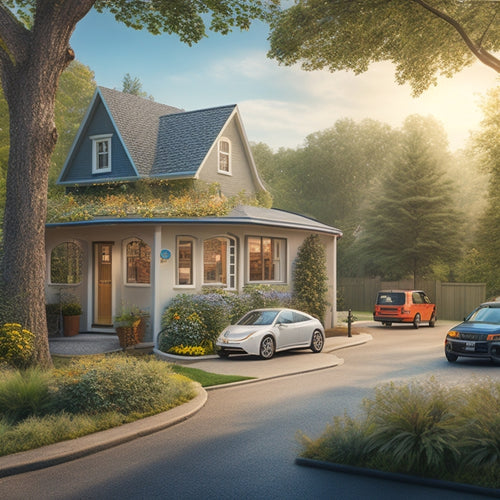
What Is the Cost of Solar Power and Solar Energy
Share
You're contemplating switching to solar power, and want to know the cost. The average cost of solar panels ranges from $2.50 to $3.50 per watt, with a typical residential system costing $5,000 to $35,000. However, your total cost will depend on various factors, including system size, installation complexity, local market conditions, and financing options. You'll also need to take into account the cost of inverters, mounting hardware, and installation labor. As you investigate solar energy, you'll want to weigh the pros and cons of different financing options and understand the ongoing maintenance expenses to guarantee ideal system performance and longevity. There's more to reflect on, and understanding these details will help you make an informed decision.
Key Takeaways
- The average cost of solar panels ranges from $2.50 to $3.50 per watt, with residential systems costing $5,000 to $35,000.
- Solar incentives, utility rebates, and property tax exemptions can reduce upfront costs, while financing options and leasing agreements provide alternatives to full payment.
- The cost of solar power is affected by system size, installation complexity, local market conditions, and long-term savings potential.
- Solar energy system pricing includes the cost of panels, inverters, mounting hardware, and installation labor, with high-efficiency components and complex installations costing more.
- Ongoing maintenance expenses, including panel cleaning, inverter replacement, and system monitoring, are necessary to ensure optimal system performance and longevity.
Understanding Solar Energy Costs
When considering solar energy as a power source, one of the primary concerns is the cost. You're likely wondering if the benefits of solar energy outweigh the expenses. The good news is that solar incentives and financing options are available to help make the shift to solar power more affordable.
You can take advantage of federal and state tax credits, which can greatly reduce the upfront cost of installing solar panels. Additionally, many utility companies offer rebates and incentives for homeowners and businesses that switch to solar energy. You may also be eligible for property tax exemptions or deductions, further reducing your costs.
Financing options are also available to help you get started with solar energy. Many solar panel manufacturers and installers offer financing plans or partnerships with lenders that can help you spread the cost over time.
You can also consider leasing solar panels or entering into a power purchase agreement, which allows you to benefit from solar energy without shouldering the full upfront cost.
Average Cost of Solar Panels
As you investigate financing options and incentives, it's equally important to understand the average cost of solar panels, a significant factor in your overall investment.
The cost of solar panels varies depending on the type and quality of the panels. Generally, you can expect to pay between $2.50 and $3.50 per watt, with a typical residential solar panel system ranging from 2,000 to 10,000 watts. This translates to an average cost of $5,000 to $35,000 for a residential system.
There are different solar panel types, including monocrystalline, polycrystalline, and thin-film panels, each with its own price point. Monocrystalline panels are the most efficient but also the most expensive, while thin-film panels are the least expensive but less efficient.
The installation process also affects the overall cost, with factors like roof size, complexity, and local labor costs influencing the final price. Understanding these factors will help you make an informed decision when investing in solar power.
Factors Affecting Solar Power Cost
As you consider investing in solar power, it's crucial to understand the factors that affect its cost. Three primary factors affect the cost of solar power: system size, installation complexity, and local market conditions.
These factors can greatly influence your overall installation expenses. Here are three key considerations:
-
System size: The larger the system, the higher the cost. However, a larger system can also generate more power and provide greater savings in the long run.
-
Installation complexity: The complexity of the installation process can increase costs. This includes factors such as roof size, shape, and material, as well as the need for additional hardware or labor.
-
Local market conditions: Local market conditions, such as competition, labor costs, and permitting fees, can vary considerably depending on your location. Understanding these conditions can help you steer through financing options and find the best deal.
Solar Energy System Pricing
Your solar energy system pricing depends on various components and their respective costs. The total cost of a solar installation includes the expenses of the solar panels, inverters, mounting hardware, and installation labor.
The quality and efficiency of these components can greatly influence the overall system pricing. For instance, high-efficiency panels with a higher wattage output will generally cost more than standard panels. Additionally, the complexity of the installation, such as the need for additional electrical work or roofing modifications, can also drive up costs.
Fortunately, you have various financing options to evaluate when investing in a solar energy system. You can choose to purchase the system outright, finance it through a loan, or investigate leasing or power purchase agreements.
Each option has its pros and cons, and the best choice for you'll depend on your financial situation and goals. By understanding the components of solar energy system pricing and examining your financing options, you can make an informed decision and start utilizing the power of solar energy for your home or business.
Ongoing Maintenance Expenses
Reliability is a hallmark of a well-maintained solar energy system, and it's accomplished through regular upkeep.
As you weigh the costs of solar power, it's crucial to take into account the ongoing maintenance expenses that'll guarantee your system operates at peak performance.
Here are three key areas to focus on:
-
Solar Panel Cleaning: Dirty panels can reduce energy output by up to 25%. Regular cleaning, ideally every 6-12 months, will keep your system running efficiently.
-
Inverter Replacement: Inverters typically last 10-15 years. Replacing them when necessary will prevent energy losses and system downtime.
-
Battery Upkeep and System Monitoring: If you have a battery storage system, regular checks and maintenance will extend its lifespan.
System monitoring allows you to identify issues before they become major problems.
Frequently Asked Questions
Can I Use Solar Power With My Existing Electrical System?
Envision a Renaissance-era alchemist utilizing sunlight; now, you can too! You can integrate solar power with your existing electrical system, ensuring solar panel compatibility, by connecting an inverter to sync with your grid, allowing seamless electrical system integration.
Are There Any Government Incentives for Solar Energy Adoption?
You can utilize federal tax credits, covering up to 26% of your solar installation costs, and state rebates, which vary by location, to greatly offset the upfront investment in your solar energy system.
Can I Install Solar Panels on My Rental Property?
In medieval times, knights fought for land rights; today, you'll battle red tape. Before installing solar panels on your rental property, confirm you have landlord approval and comply with local zoning regulations to avoid a costly crusade.
Does Solar Energy Work During Power Outages?
When the grid goes down, you can rely on solar energy with solar battery storage, ensuring you maintain grid independence; this setup allows you to generate and store power, keeping your essential appliances running during outages.
Can I Sell Excess Solar Energy Back to the Grid?
Sparkling savings await you, as you successfully sell surplus solar energy back to the grid through net metering benefits, offsetting your electricity costs and potentially earning credits by selling electricity to your utility company.
Related Posts
-

Why Certification Matters for Residential Panels
You're looking to understand why certification matters for residential panels. Basically, third-party certification g...
-

Why Nearby EV Conversion Shops Matter to You
Having a nearby EV conversion shop means you'll experience the benefits of a more personalized, convenient, and susta...
-

What You Need to Know About RV Solar Maintenance
When you're out on the road, your RV's solar panel system is your lifeline. But without regular maintenance, you're l...


